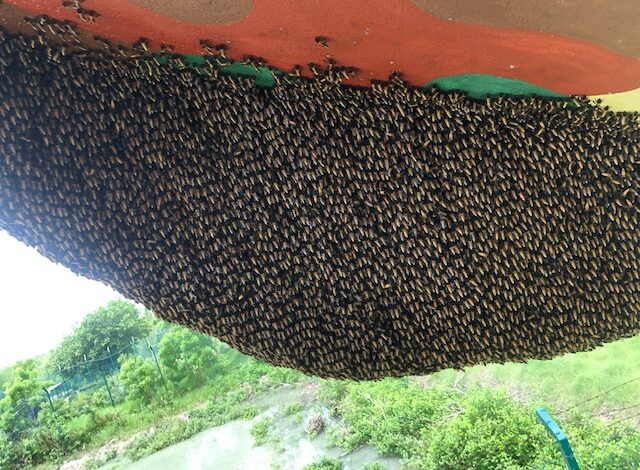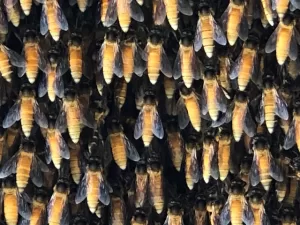Analysis /OpinionEnvironmentIndia
Indian apiculture industry under serious stress
Bee keeping challenges:Overall both the ecological cost and the human cost surpasses the small economic benefits made. Proper commercial apiculture practices are yet not quite common for people living in this region.


Saikat Kumar Basu
Agricultural biodiversity is an important global natural resource that is slowly undergoing depletion and degradation due to various natural and predominantly anthropogenic causes. Unless we take appropriate steps for food conservation today, we may be hit hard by global agricultural biodiversity depletion to an alarming and irreversible level negative for the entire planet and human society. Unorganized and unskilled cheap labour force is the cornerstone of the agro-industry around the globe with special emphasis to developing and under developed nations across the globe. Apiculture both commercial, non-commercial as well as legal and illegal hunter gatherer type operations as seen in the mangrove forests of the Sunderbans in India (West Bengal) and Bangladesh is a perfect example of this ecological as well as economic erosion in particular.
The mangrove wild honey bees are of species Apies dorsata Hill type. They collect nectar and pollens from the flowers of different mangrove species and their comb sizes are very big. Although some of the commercial beekeepers keep their bee boxes near the mangrove forest to facilitate collection of nectarines by commercial honey bees from the local mangrove plants. However, this effort has not been very commercially viable and successful compared to placing bee boxes in the conventional crop fields with standing crop in full bloom.
However, direct harvest of honey from the mangrove forest still remains the preferred choice of many in the Suburban region. Most of this hill type variety is exploited by extremely poor and marginal communities for their basic livelihood as mangrove honey has a high market price and demand in local, regional and international markets. But the damage to the bee populations due to crude unscientific method of honey collection as well as the vulnerability and high risk of human life deep inside the mangrove forest is a double edged sword. The honey collected is also contaminated with various impurities, dead insects, excretory materials, eggs , larvae due to crude collection process and lack of proper honey processing facilities available to such marginal communities.
Overall both the ecological cost and the human cost surpasses the small economic benefits made. Proper commercial apiculture practices are yet not quite common for people living in this region. Their attitude is still like that of short time hunting abs gathering g, both legally and illegally. The accidents that happen here due to tiger and crocodile attacks, snake bites, piracy, harassment by forest guards, money lenders and rural politicians have been negatively impacting their life and livelihood and rapidly destroying their local ecosystems. There is very little or zero support from the local government and related agencies.

Commercial apiculture is practiced successfully in many places across mainland China, South and South East Asia. The practice of culturing honey bees in bee boxes, collecting honey without damaging honey combs by simple hand operated machine by centrigual force, filtering by musline cloths is known to many growers and you may find it in many villages. This has been an important livelihood for many marginal rural and aboriginal communities, forest fringe residents. The Indian Khadi Gramodyog provided training and sell bee boxes to interested farmers. But the difficulty of Sunderban region is a well established fact especially due to various natural and anthropogenic factors. This is a highly sensitive subject that is in need of immediate attention for scientific culture by generating awareness and by providing proper training and support.
But the ground realities are however extremely pathetic. The government banks do not provide loans to these poorest of the poor as they have a history of failing to pay back their loans due to several factors. Unfortunately they are exclusively dependent on local money lenders for the investment. The same banks however has no problem in panning out several millions of rupees cash to our honourable industrialists, who are exceptionally good in stealing the money and not paying back making the banking industry sick. Then there is no problem for the government, administration as well as judiciary; the problems are negate failure of payments of few thousand rupees if marginal farmers.
Honey producers live at the mercy of these eminent socialites abs are exploited at every stage. The honey collected both legally or illegally are sold at a fixed price set by sone influential middlemen supported by both government and bureaucrats in close nexus with corrupt businessmen keeping their profit sky high and reducing the profit margin of farmer/producers at a minimal level so that they can just survive to continue the vicious cycle next year. The honey is then sold to big brand companies who professionally adulterate them with cheap sugar, synthetic colour and flavour and bottle them abs they land on your breakfast table at a reasonably high price. The best quality honey is imported to international markets to get our beneficiaries a massive profit and tax benefits. Often pesticide contain Ami step or other wise low grade honey imported is rejected overseas and are dumped into our local market for selling at a cheaper price for local consumers. The poorest of the poor farmers continue to suffer and impacted by abject poverty. Apiculture industry is a migratory industry and the apiculturists need to move their bee boxes in trucks to various agro-climate regions depending on the floral seasons and available standing crops in the field.

Such migratory apiculturists are subjected to physical, mental and economic abuse by farmers in whose plots the boxes are placed, by policemen and civic volunteers, panchayat members as well as local goons. They have to bribe at every stage just to simply do their work. There is absolutely no support for these helpless communities from both state and central governments due to internal political and business understanding as well as secret transactions beneath the table. This the poor bee farmers continue to suffer while those around them are getting flatulent due to overflow of cash from both domestic and foreign economy. Few beekeeper’s cooperatives and other related bogus organizations are functional but only at a very limited scale. The ignorance and negligence towards the development and establishment of a modem apiculture industry both in India and West Bengal has failed miserably. However, in spite of the odds the apiculture farmers and producers are fighting to survive. Our ecology and economy is unfortunately not holding hand in hand.
There is very little awareness among farmers regarding benefits of the pollinators. Beekeepers are physically abused at many places by crop producers due to this. Private companies are now major producers of commercial honey , Khadi is an organization of the by gone era. Whatever pure quality honey is still sold comes from organizations like Khadi and local forest departments. Apiculture is the worst neglected agricultural sector of India. India and China are two big giant producers, consumers and distributors of adulterated honey.
Fairly recently the Center of Science at New Delhi demonstrated that all major honey samples from sealed bottles of reputed commercial manufacturers across India are openly selling adulterated honey using cheap sugar syrup indiscriminately. There is very little or no monitoring done knowingly or unknowingly by our regulatory agencies. China has taken honey adulteration to almost an artistic level of international excellence and repute.
Photo credit: Saikat Kumar Basu






